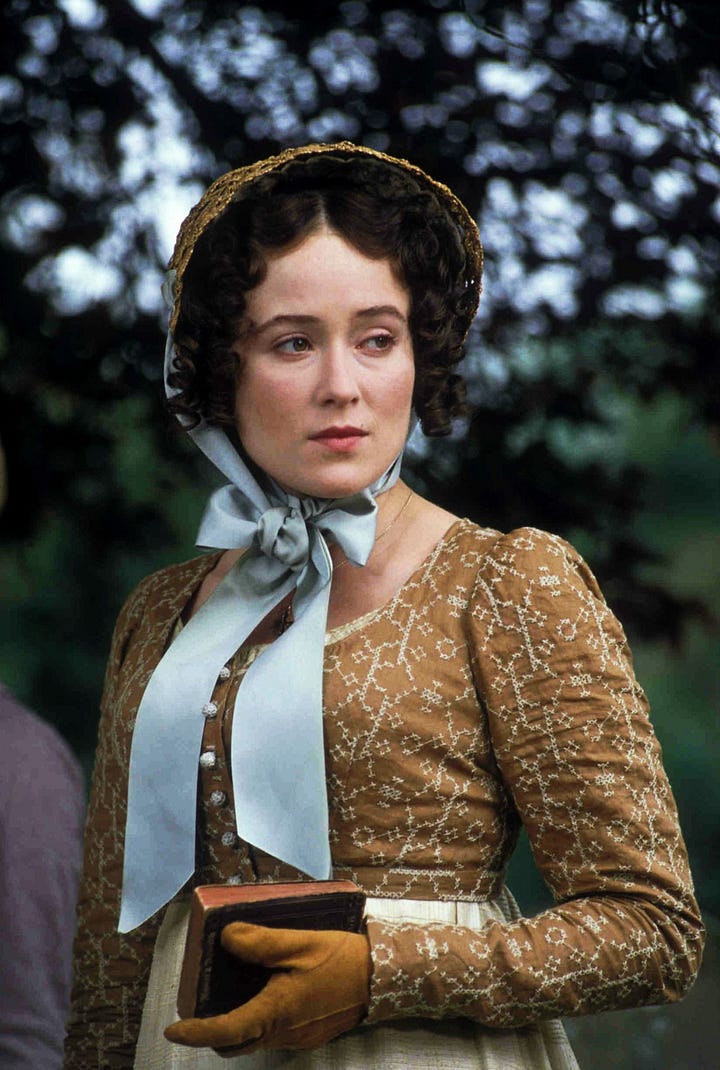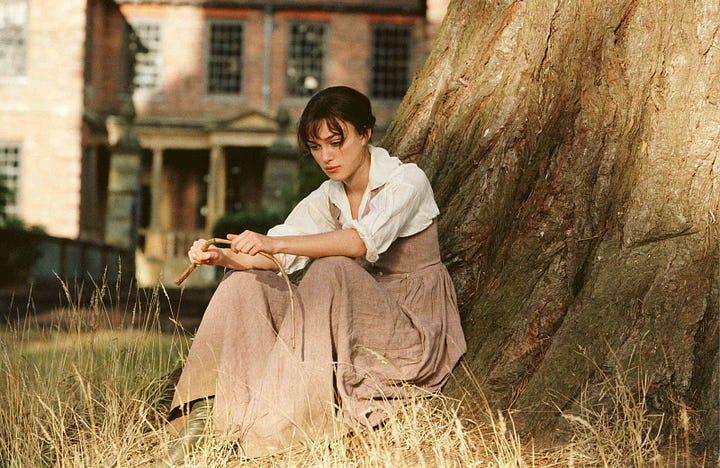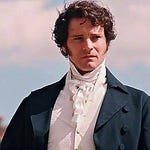Hello friends!
Today something fun!
Many of you will be aware that this year marks the 250th anniversary of Jane Austen’s birth. I’ve noticed quite a lot of Austen activity online. Janeites are emerging to observe the appropriate rites and rituals. The Austen altar is mounded with fresh flowers. Many of you are rereading the novels. I have, for example, recently reread Pride and Prejudice. Reader, it was a joy.
On the box
Naturally, reading Pride and Prejudice caused me to remember my extreme devotion to the 1995 BBC miniseries, which then caused me to re-watch it all these years later. I’m going to assume I’m not the only die-hard fan of the 1995 BBC Pride and Prejudice. It came out when I was a teenager and aired in Australia on Sunday nights. Prudently, I taped all the episodes then proceeded to watch them hundreds of times each. (Re-watching favourite shows and movies was a teenage rite of passage in those days of yore. I’ve tried to explain this to my children – that we just watched the same thing over and over because we had a limited number of videotapes (which were constantly being taping over) – but they don’t quite understand the hardware scarcity that governed cultural consumption before the internet.)1
It’s difficult to exaggerate how much I loved that BBC adaptation. I loved the actors. I loved the screenplay. I adored Jennifer Ehle. I could quote lines of dialogue from memory. The 1995 miniseries brought Austen’s novel alive for me. Reader, it was a joy.
On the silver screen
When the 2005 movie adaptation of Pride and Prejudice first came out, I couldn’t grasp why anyone would bother trying to improve on the unimprovable 1995 Pride and Prejudice. What a waste of time and effort! Naturally, if you’ve watched and acclimated to the luxurious pacing of the BBC version, the movie seems to gallop ridiculously. I could not abide any of the casting decisions. The way the actors delivered their lines was wrong. It was all wrong, wrong, wrong! Reader, it was wrong.
With the benefit of time and… – I was going to say maturity but that can’t be it – I’ve realised that I was probably judging the movie adaptation a teensy bit harshly. I was criticising it for not being the BBC adaptation. I was criticising it for its two-hour runtime. And actually, the two-hour runtime presents a fascinating (though, to screenwriters, not new) challenge – how to compress a 300 page novel into a movie-length container? Which characters and story lines are dispensable and which are not?


Miniseries vs movie
Today I bring you the first of a two-part conversation with
about those two screen adaptations of Pride and Prejudice. It feels timely. After all, in addition to being Jane Austen’s semiquincentenary, it is also the 30th anniversary of the 1995 BBC adaptation of Pride and Prejudice and the 20th anniversary of the 2005 movie adaptation.Haley had rather a different experience of the screen adaptations as you will hear – the film version came out when she was a teenager and (as with the BBC version for me) it arrived at an impressionable age and was duly loved and re-watched. Our conversation was wide-ranging and a lot of fun.
A conversation in two parts
If you’re tuning in, it will probably help to have seen both adaptations – we talk about everything, including endings. Spoilers abound. In part 1 of our conversation, Haley and I discuss the art of adaptation, what we’re looking for in an adaptation, the difference in artforms (books and film), the things we liked and disliked in each, the first Darcy proposal scene (treated so differently in each), the editing, the respective Mrs Bennets, the visual aesthetics, the film score and cinematography.
In part 2, coming next week, we discuss the Wickham story line (much trimmed down in the 2005 movie), the actors and casting decisions, historical accuracy in each adaptation (including a few minor bloopers), and the ending. Or should I say endings. For there are several.
Haley Larsen
Haley was a wonderful, informed, intelligent and warm interlocutor! I’m so grateful for her time and participation in this conversation. She writes an excellent newsletter on Substack called Closely Reading and recently lead a group read of Pride and Prejudice. You can find all Haley’s Pride and Prejudice posts at
– but hurry, they will be going behind a paywall in May.More Austen…
Wanting a bit more Austen chat in your life? Here are a few bits and pieces to enjoy at your leeeeisure:
- has been putting her considerable talents to developing and applying maths formulas to the eligible bachelors (and their merits) in each of Austen’s novels – here’s the one for Pride and Prejudice. Fun and compelling!
- recently wrote an excellent defense of Mr Bennet. also wrote about Mr Bennet and the mischief of neglect.2
- has a book coming out called Wild for Austen: A Rebellious, Subversive, and Untamed Jane – this is exactly the side of Jane Austen I would like to know more about. It’s available for preorder. Go on!
- writes which is reading all of Austen’s novels in 2025. The Austen Connection has already read Northanger Abbey and is currently reading Sense and Sensibility. The Pride and Prejudice readalong begins in May. You can find the reading schedule here.
Finally
I invite you to tell us your thoughts about the 1995 miniseries and 2005 movie – the comments section beckons!
And if you’re new to my newsletter, Wolfish!, we recently read To the Lighthouse by Virginia Woolf. You can find the complete set of posts and podcasts here if you’re interested.
Hooroo for now!
Tash
It’s also difficult to convey the singular disappointment of reaching the climactic scene in The Blues Brothers only to find it taped over with a Chicago Bulls game. The Illinois Nazis fall from the sky and then Pippen feeds the ball to Jordan. Cue collective groan.
I briefly mentioned this essay by Henry in my conversation with Haley.











Share this post